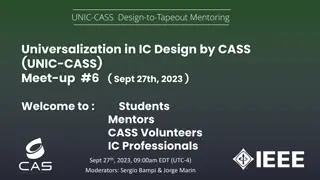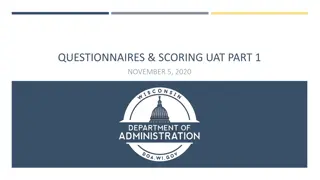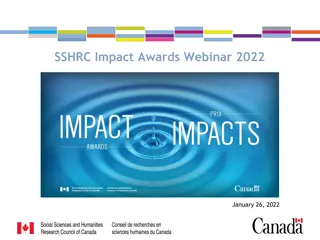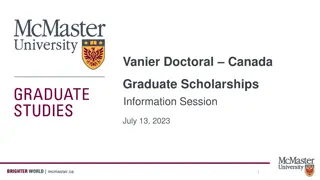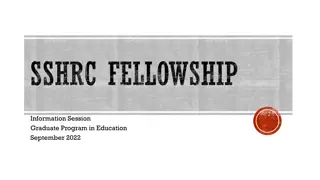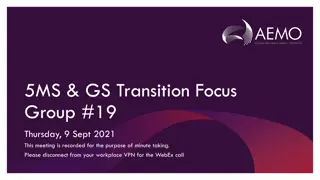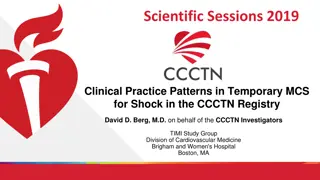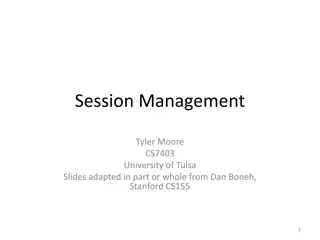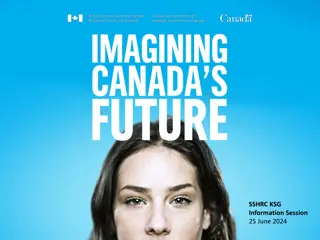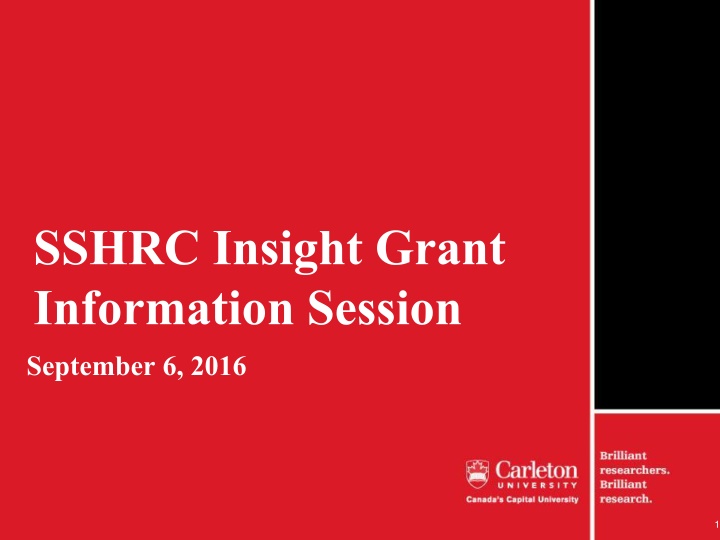
Insight Grant Information Session Overview
Explore insights from the SSHRC Insight Grant Information Session held on September 6, 2016, covering topics such as program objectives, grant details, application process, and updates for 2016. Gain valuable knowledge on preparing a budget, evaluation criteria, and research expertise funding while ensuring compliance with guidelines and principles for successful grant applications.
Download Presentation

Please find below an Image/Link to download the presentation.
The content on the website is provided AS IS for your information and personal use only. It may not be sold, licensed, or shared on other websites without obtaining consent from the author. If you encounter any issues during the download, it is possible that the publisher has removed the file from their server.
You are allowed to download the files provided on this website for personal or commercial use, subject to the condition that they are used lawfully. All files are the property of their respective owners.
The content on the website is provided AS IS for your information and personal use only. It may not be sold, licensed, or shared on other websites without obtaining consent from the author.
E N D
Presentation Transcript
SSHRC Insight Grant Information Session September 6, 2016 1
Nothing in this presentation should be interpreted to replace a thorough and complete reading of the SSHRC Program Guidelines. (Tip #1) 2
AGENDA: 1. Insight Grant 101 2. Evaluation and Adjudication 3. Prepare a Budget 4. Back to Basics: Tips for Success 5. Questions and Answers 3
Insight Program Objectives build knowledge and understanding from disciplinary, interdisciplinary and/or cross-sector perspectives through support for the best researchers; support new approaches to research on complex and important topics, including those that transcend the capacity of any one scholar, institution or discipline; provide a high-quality research training experience for students; fund research expertise that relates to societal challenges and opportunities; and mobilize research knowledge, to and from academic and non-academic audiences, with the potential to lead to intellectual, cultural, social and economic influence, benefit and impact. 5
Insight Grant Details Applicant: Principal Investigator alone or in a team Duration: 3 to 5 years New: Total Request $400,000 (minimum $7,000, maximum $100,000 in a given year) Funding: No separate envelope for New Scholars Equipment (Tools) up to $100,000 6
New in 2016 New: the Tri-Agency Statement of Principles on Digital Data Management (2016) Updated: Research Data Archiving Policy has been renewed to reflect these principles of excellence in data stewardship Revised: the Collection, Use and Disclosure of Personal Information to be fully compliant with federal government standards. Updated: Definition of Terms page now has an updated definition of emerging scholars . Noteworthy: (i) Insight Grants merit review structure and updates to the Preparing an Insight Development and Insight Grants research-creation application and (ii) further harmonization of invitation process to participants for grants. 7
Joint Initiatives New: SSHRC and DND have entered into a joint initiative to support social sciences and humanities research and related activities pertaining to DRDC s (Defence Research and Development Canada) research priorities. New: SSHRC and Genome Canada have signed a joint initiative agreement to jointly support social sciences and humanities research and related activities pertaining to the Societal Implications of Genomics Research Ongoing: Sport Participation Research Initiative 8
Multi-Agency SSHRC, NSERC, CIHR and the CFI are working to enhance the co-ordination of their programs, activities and policies. Applicants to any of SSHRC s grant or scholarship funding opportunities may collaborate with researchers working in fields other than the social sciences and humanities. SSHRC s Insight Grants and Insight Development Grants enable funding to small teams that include participation from researchers (including postdoctoral researchers) from beyond the social sciences and humanities. 9
Eligibility (Multiple Applications) Applicants may not apply for an Insight Grant and an Insight Development Grant within the same calendar year as Principal Investigator. This means: A researcher who applied for an Insight Development Grant as a Principal Investigator in February 2016 may not apply for an Insight Grant as a Principal Investigator in October 2016. A researcher who applies for an Insight Grant as a Principal Investigator in October 2016 may apply for an Insight Development Grant as a Principal Investigator in February 2017, provided that the objectives of the research are different. This restriction does not apply to co-investigators or collaborators. 10
Eligibility (Previous funding) Are you a principal investigator on a SSHRC grant? Is the grant in its final year of funding in 2016-17? You are eligible to apply for a Insight Grant as a PI in Oct 2016 There is no limit to the number of SSHRC applications on which a researcher may be listed as a co-applicant or collaborator. Reminder: Applicants who have received a SSHRC grant of any type but have failed to submit a final research report by the deadline specified in their Notice of Award are not eligible to apply for another SSHRC grant until they have submitted the report. 11
Key Application Components Summary text box online, 1 page, 3800 characters Detailed Description Must address Challenge & Feasibility criteria except where dealt with in other sections (eg. Expected outcomes, KMB) 6 pages max Objectives, Context (incl. lit review & theoretical approach), Methodology SSHRC encourages applicants to, if applicable, discuss how research data will be managed Capability sub-criteria should be addressed in CV and Research Contributions 13
Key Application Components Research Team, Previous Output and Student Training 4 pages max Knowledge Mobilization Plan 1 page max **Open Access and Data Management List of References 10 pages max cited in your proposal Expected Outcomes and Expected Outcomes Summary online form text box online, 1 page 14
Key Application Components Funds Requested from SSHRC online form, estimate as accurately as possible Budget Justification Feasibility criterion 2 pages max Fully justify, Distinguish types of travel (research, communications/Kmb) Suggested Reviewers list up to 3 Cdn or foreign specialists Research Contributions 4 pages max, (i) Relevant Research Contributions over the last 6 years; (ii) Other Research Contributions, (iii) Most Significant Career Research Contributions, (iv) Career Interruptions and Special Circumstances; (v) Contributions to Training 15
Application components Other sections, if applicable Exclusion of Potential Reviewers 1 page, confidential Research-Creation Support Material 1 page Sport Participation Research Initiative, Statement of Relevance (1 page) Department of National Defence, Statement of Relevance (1 page) Environmental Impact Appendix A Optional Response to Previous Critiques text box online, 1 page, 3800 characters Funds from Other Sources (online) 16
EVALUATION AND ADJUDICATION
Evaluation Criteria Challenge The aim and importance of the endeavour (40%): originality, significance and expected contribution to knowledge; appropriateness of the literature review; appropriateness of the theoretical approach or framework; appropriateness of the methods/approach; quality of training and mentoring to be provided to students, emerging scholars and other highly qualified personnel, and opportunities for them to contribute; and potential influence and impact within and/or beyond the social sciences and humanities research community. 18
Evaluation Criteria (contd) Feasibility The plan to achieve excellence (20%): probability that the objectives will be met within the timeline proposed; appropriateness of the requested budget and justification of proposed costs; indications of financial and in-kind contributions from other sources, where appropriate; quality and appropriateness of knowledge mobilization plans, including effective dissemination, exchange and engagement with stakeholders within and/or beyond the research community, where applicable; and appropriateness of the strategies for conducting the activity/activities proposed. 19
Evaluation Criteria (contd) Capability The expertise to succeed (40%): quality, quantity and significance of past experience and published and/or creative outputs of the applicant and any co-applicants, relative to their roles in the project and their respective stages of career; evidence of other knowledge mobilization activities (e.g., films, performances, commissioned reports, knowledge syntheses, experience in collaboration/other interactions with stakeholders, contributions to public debate and media), and of impacts on professional practice, social services and policies, etc.; evidence of contributions to the development of talent; and potential of the applicant/co-applicant to make future contributions. 20
Challenge Excellent Highly original, at the forefront of the field. Theoretical/conceptual approach or framework is focused, fully explained, well developed. Literature review is reasonably complete, up-to-date, and linked to the proposed research. Methodology is well described and will lead to meaningful results. Training and likelihood of influence/impact within/beyond research community are excellent. Original, meets quality standards, will contribute to the development of the field. One or more of the following elements should have been better developed: literature review, theoretical/conceptual framework, methodology. Training and likelihood of influence/impact are very good. Very Good Good A good research proposal, but lacks at least one compelling element. Adjudicator has concerns regarding one or more of: originality/novelty, literature review, theoretical/conceptual framework, methodology. Training, likelihood of influence/impact are good. Low probability of significant contribution to the field. Serious shortcomings in one or more of: originality/novelty, literature review, theoretical/conceptual framework, methodology. Training, likelihood of influence/impact are modest. Modest (Not Recommende d for Funding) 21
Feasibility Excellent Objectives are explicit and clearly defined and there is a very high probability of meeting them. The strategies/timelines for the proposed research are coherent, realistic and appropriate. All budget components are well justified, and the budget s overall link to the proposed research is evident. The knowledge mobilization/dissemination plan is effective and very likely to achieve results. Objectives are defined and it is likely that they will be met. One or more of the following elements could have been better developed: strategies/timelines for the proposed research, justification of the budget, knowledge mobilization/dissemination plans. Objectives are identified but the adjudicator has doubts that they will be met. Concerns regarding one of more of: strategies/timelines for the proposed research, justification of the budget, knowledge mobilization/dissemination plans. Objectives are ill-defined and there is low probability of achieving success. Serious shortcomings in one or more of: strategies/timelines for the proposed research, justification of the budget, knowledge mobilization/dissemination plans. Very Good Good Modest (Not Recommende d for Funding) 22
Capability (Regular Scholar) Regular Scholar Excellent Recognized nationallyand perhaps internationally for the excellent quality and substantial impact of publications within or beyond the field. Distinguished publication record, has published both consistently and recently. Where applicable, significant publications from previous funding: significant contributions to training future researchers; where appropriate, has disseminated results beyond academia. Very Good Recognized for quality and impact of publications within or beyond the field. Has published both consistently and recently. One or more of the following elements could have been better demonstrated: where applicable, publications from previous funding; contributions to training future researchers; where appropriate, dissemination of results beyond academia. Good Has made some impact within or beyond the field. Has published fairly regularly and recently. Adjudicator has concerns regarding one or more of: where applicable, publications from previous funding; contributions to training future researchers; where appropriate, dissemination of results beyond academia. Does not appear to have made an impact within or beyond the field. Does not appear to have published regularly or recently. Fails to demonstrate experience in one or more of: where applicable, publications from previous funding; contributions to training future researchers; where appropriate, dissemination of results beyond academia. Modest 23
Capability (New Scholars) New Scholar Excellent Recognized for originality and quality of research and publications within or beyond the field. Significant research productivity. Where applicable, has made good contributions to training future researchers; where appropriate has disseminated results beyond academia. Research and publications considered fairly original and of very good quality. Has demonstrated good recent productivity. One or both of the following elements could have been better demonstrated: where applicable, contributions to training future researchers; where appropriate, dissemination of results beyond academia. Has demonstrated competence to conduct research. Has made some progress toward establishing a track record. Adjudicator has concerns regarding one or both of: where applicable, contributions to training future researchers; where appropriate, dissemination of results beyond academia. Not yet demonstrated capacity to successfully carry out the research proposed. Has yet to make demonstrable progress towards establishing a track record. Fails to demonstrate experience in one or both of: where applicable, contributions to training future researchers; where appropriate, dissemination of results beyond academia. Very Good Good Modest 24
Adjudication Committees Four types (i) discipline-based; (ii) groups of disciplines; (iii) multidisciplinary; (iv) thematic 435-01 - Philosophy 435-02 - History 435-03 - Fine Arts, Research-Creation 435-04 - Literature 435-05 - Medieval, classics, religious studies 435-07 - Economics 435-08 - Sociology, demography and related fields 435-09 - Geography, urban planning and related fields 435-10 - Psychology 26
Adjudication Committees 435-11 - Political science and public administration 435-12 - Education and social work 435-13 - Anthropology and archaeology 435-14 - Business, management and related fields 435-15 - Linguistics and translation 435-16 - Communications, media studies, gender studies, library and information science, related fields 435-17 - Law and criminology 435-21 - Aboriginal research 435-22 - Multidisciplinary Humanities 435-23 - Multidisciplinary Social Sciences 27
Adjudication Components Adjudication Committees Each broad group will subdivided on an as-needed basis into: Disciplinary, multi-disciplinary or thematic committees If a sufficient number of Aboriginal research and/or research- creation applications are received, SSHRC may establish distinct adjudication committees for these. Minimum two committee readers per application who score the application SSHRC will seek, but cannot guarantee, at least two external assessors per proposal Adjudication committees consider but are not bound by the judgments of the external assessors. 28
Adjudication Components Multidisciplinary Review In the case of applicants who have selected a multidisciplinary committee (humanities focused 435-22 and social sciences focused 435-23), relevant expertise to review the proposal may also be sought from within the larger pool of Insight Grants committee membership. Applicants may contact SSHRC to discuss committee selection. Note: SSHRC will make efforts to accommodate applicant preferences. However, SSHRC reserves the right to determine an application s review process and committee assignment. 29
Preparing a Budget Committees will use the principle of minimum essential funding to guide their discussions of project budgets the committee should assess whether, overall, the proposed budget is reasonable, well-justified, and appropriate for carrying out the proposed activities Committees may consider failing a project on the Feasibility criteria if they deem that 30 per cent or more of the overall budget request is insufficiently justified and/or not appropriate to the proposed objectives or outcomes of the project. Committees may recommend budget reductions where they determine that the request is inadequately justified and/or not appropriate as described above, and where they judge that savings could be achieved without jeopardizing the project objectives 31
Preparing a Budget The Tri-Agency Financial Administration Guide outlines both eligible and ineligible costs applicants must justify all proposed budget expenditures No agency-directed minimums and/or maximums for student payroll Suggestion: always include 15% for payroll benefits Use and refer to an online travel website (Air Canada, Expedia, Trivago) for travel costs 32
Preparing a Budget The National Joint Council provides: kilometre rates, Appendix B http://www.njc-cnm.gc.ca/directive/travel-voyage/s-td-dv-a2- eng.php North America per diems, Appendix C http://www.njc-cnm.gc.ca/directive/index.php?sid=98&lang=eng International per diems, Appendix D http://www.njc-cnm.gc.ca/directive/app_d.php?lang=eng 33
Preparing a Budget Examples: MA Student 12 months x $1000 x 1.15 benefits = $13,800 1 Undergrad student May Aug 16 weeks x 30 hrs per week x $18 per hour x 1.15 = $9,936 Fieldwork travel, Rome, Italy June 10 30, 2017 1 traveller (PI) Airfare ($716) + Accommodations (20 nights x $200 per) + Per diems (20 days x $100 per day) = $6,716 Conference travel, Calgary, Alberta, Aug 3-5, 2017 Association of Best Researchers Airfare ($816) + Accommodations (3 nights x $177) + Per diems (3 days x dinner only $50 per day) + conference registration fees ($350) = $1847 34
BACK TO BASICS: STRATEGIES FOR SUCCESS
Our Top 10 Tips 1. Craft a clear and pithy research question! 2. Explain why your project is not only timely and important but how your approach is novel or original. 3. Ensure your literature review is analytical, not merely descriptive. Your research question should clearly emerge from your literature review. 4. Fully describe your theoretical framework, basing your justification on your research question and your past work. 5. Ensure you articulate a theoretical contribution of your proposed study. 36
Our Top 10 Tips (contd) 6. Fully describe your methodology, including very specific details on data collection and analysis. 7. Ask your departmental Research Mentor to critically review your CV in light of your proposed research topic. Take their advice seriously! 8. All items in your budget justification explicitly and convincingly connected to the project s objectives and activities. 9. Innovation in the dissemination and knowledge mobilization plans will be favourably noticed. 10. Explain your timeline based on past experience. 37
Some Useful SSHRC Links Definition of Terms http://www.sshrc-crsh.gc.ca/funding-financement/programs- programmes/definitions-eng.aspx Future Challenge Areas http://www.sshrc-crsh.gc.ca/society-societe/community- communite/Future_Challenge_Areas- domaines_des_defis_de_demain-eng.aspx http://www.sshrc-crsh.gc.ca/society-societe/community- communite/Imagining_Canada_s_Future_Technical_Report- Rapport_technique_d_imaginer_l_avenir_du_Canada-eng.pdf Peer Review Manual http://www.sshrc-crsh.gc.ca/funding-financement/merit_review- evaluation_du_merite/index-eng.aspx 39
Useful Links Contd Aboriginal Research Statement of Principles http://www.sshrc-crsh.gc.ca/about-au_sujet/policies- politiques/statements-enonces/aboriginal_research- recherche_autochtone-eng.aspx Guidelines for the Merit Review of Aboriginal Research http://www.sshrc-crsh.gc.ca/funding-financement/merit_review- evaluation_du_merite/guidelines_research- lignes_directrices_recherche-eng.aspx Guidelines for Effective Research Training http://www.sshrc-crsh.gc.ca/funding-financement/policies- politiques/effective_research_training- formation_en_recherche_efficace-eng.aspx 40
Useful Links Contd Guidelines for Tools for Research and Related Activities http://www.sshrc-crsh.gc.ca/funding-financement/policies- politiques/support_tools_soutien_outils-eng.aspx Tri Agency Financial Administration Guidelines (including Use of Grant Funds) http://www.nserc-crsng.gc.ca/Professors- Professeurs/FinancialAdminGuide- GuideAdminFinancier/index_eng.asp Tri-Agency Open Access Policy on Publications http://www.science.gc.ca/default.asp?lang=En&n=F6765465-1 Draft Tri-Agency Statement of Principles on Digital Data Management http://www.science.gc.ca/default.asp?lang=En&n=83F7624E-1 41
Useful Links Contd Guidelines for Effective Knowledge Mobilization http://www.sshrc-crsh.gc.ca/funding-financement/policies- politiques/knowledge_mobilisation- mobilisation_des_connaissances-eng.aspx Multiple Applications Grants, Fellowships and Scholarships http://www.sshrc-crsh.gc.ca/funding-financement/policies- politiques/multiple_apps-demandes_multiples-eng.aspx Guidelines for Research-Creation Support Materials http://www.sshrc-crsh.gc.ca/funding-financement/policies- politiques/research_creation-recherche_creation-eng.aspx 42
Thank you! 43

